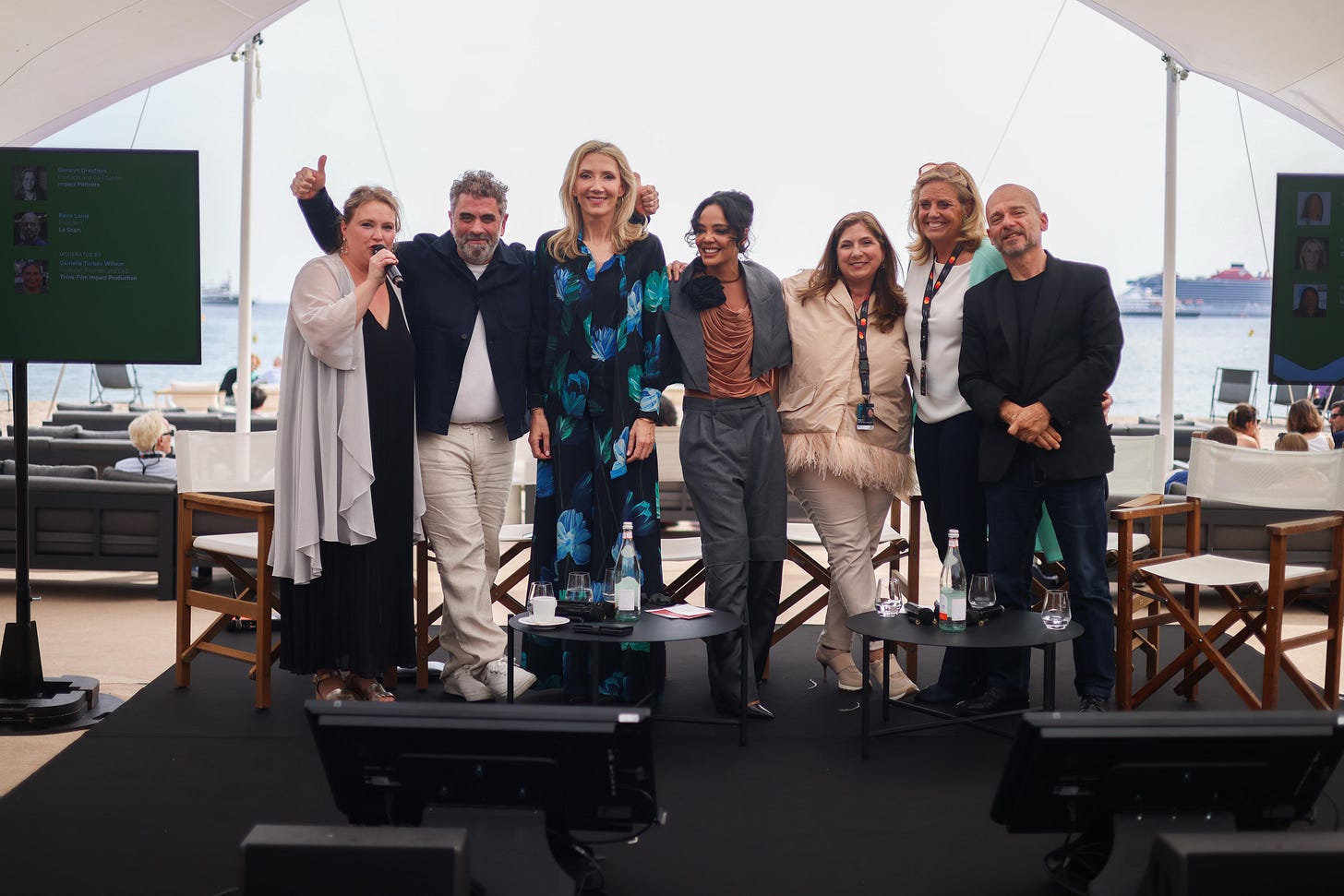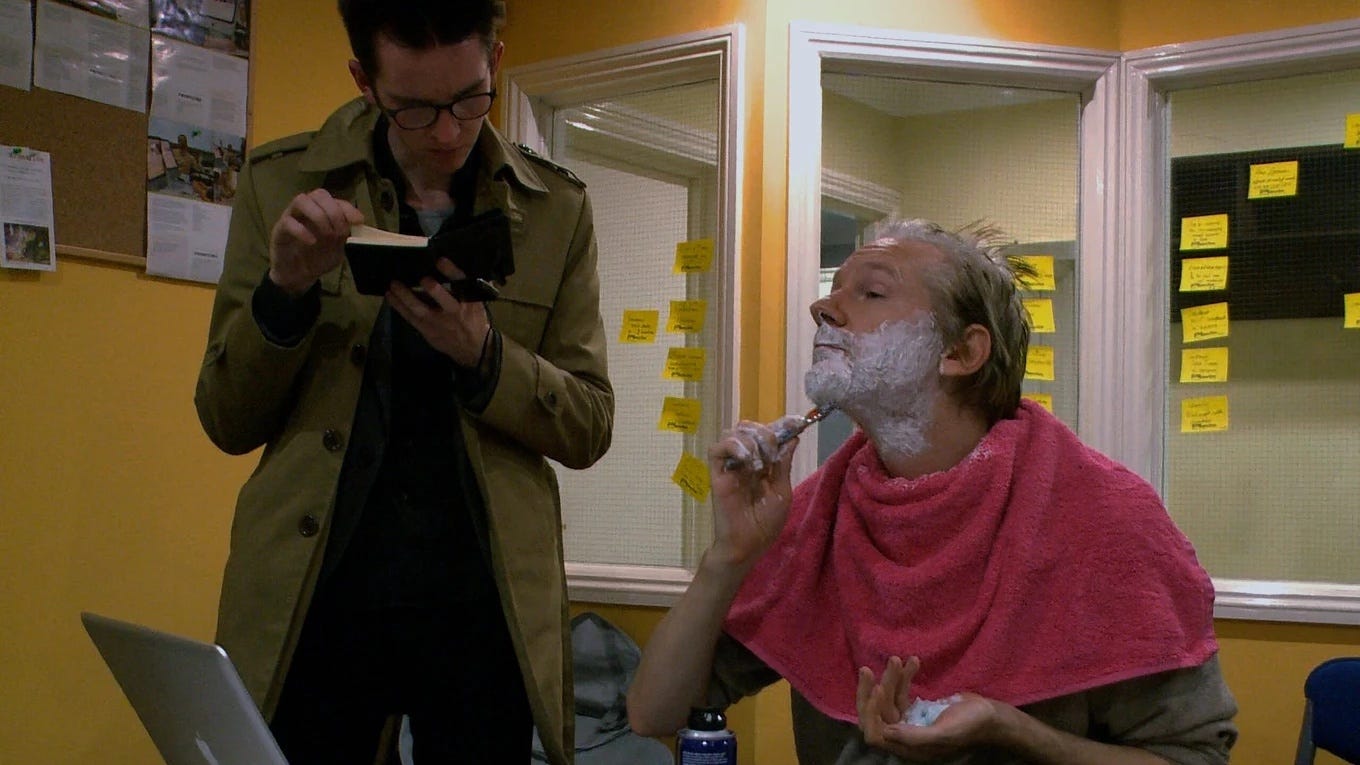
In this week’s newsletter, Pure Nonfiction host Thom Powers reports from the Cannes Film Festival…
Today, the inaugural Golden Globes Prize for Documentary was presented to Eugene Jarecki who was selected from a group of five nominees screening new works at Cannes. Jarecki’s new film The Six Billion Dollar Man about Julian Assange has its world premiere on Wednesday. The other nominees were Andrew Dominik, Alex Gibney, Mariska Hargitay and Raoul Peck. This new recognition was brainstormed quickly in the past couple months, in a partnership between the Globes and the Artemis Rising Foundation (see Variety).
What’s notable is that the Golden Globes aren’t known for celebrating documentary. In recent years, the organization has undergone multiple controversies (read a recap in Buzzfeed). They were acquired in 2023 by Penske Media Corporation (that also owns Variety, The Hollywood Reporter, Indiewire, Deadline among other publications and events). Now under the leadership of president Helen Hoehne, the Globes appear eager to move into a new era, including a recently announced podcast award.
Will we someday see a Best Documentary Award at the televised ceremony? President Hoehne had encouraging words on a panel in Cannes: “I think today is just the first step, for me at least, to celebrate this genre and really highlight the filmmakers.” She went on to say, “Documentary changes the world…and I think especially in this turbulent time that we live, this is so essential.”
No doubt, it’s easy to be cynical about awards. But when documentary makers compete for audience attention, it’s a vital asset to have an award that’s a household name. Consider No Other Land that was turned down by major U.S. distributors. After winning the Academy Award, the film team undertook self-distribution in the U.S. and grossed more than $2 million in box office. The Oscar prestige helped the film’s supporters push back when Miami Beach’s mayor threatened to close O Cinema for showing it.
Yesterday, on the eve of the prize being given in Cannes, I sat down with three people who were instrumental to make it happen: Danielle Turkov Wilson, the founder of Think-Film Impact Production; Geralyn Dreyfous, co-founder of Impact Partners; and Regina K. Scully, the founder of the Artemis Rising Foundation.
Below is an edited version of our conversation.
Thom: Can you explain how this Golden Globes award for documentary came to be at Cannes?
Danielle: For two years, I had been running an impact program where the Globes had played a fundamental role in the panels, discussing impact, documentaries, and awards. And then I was in Copenhagen [at CPH:DOX in March] with Geralyn when they called and said, “Look, we don't want to do a panel this year. We want to give a documentary award. But we need partners. We need to make it sustainable. All this is not something within the framework of the Globes. Could you speak to people?” And I was like, “Well, I'm standing right next to someone who would really believe in this.”
Thom: For people who don’t know Think-Film Impact, can you describe what you do?
Danielle: Essentially, Think-Film Impact have been running socio political campaigns for movies for the last ten years or so. I’ve had the privilege of working with Geralyn on many of those campaigns – most notably Navalny. It's about social justice: making and changing rules to protect people and humanity. And that's really Think-Film’s DNA. We are like the advocates in the film business. With Navalny, we had the sanctions package on Russia announced at the screening in Brussels. It's about making sure that we can deliver real social justice with films and not just communications campaigns.
Thom: Geralyn, when Danielle got this call, what happened next?
Geralyn: We had a call with [Globes President] Helen Hoehne and she just leaned in. You could tell she has that journalist ferociousness in her eyes. She said, “Listen, we're all journalists, all of our members. We see what's happening in the world. We want to elevate this craft because we need it. So can we test out this idea?”
Thom: It was the support of Artemis Rising that made this idea into a reality. So Regina, what motivated you to put resources behind it?
Regina: Our foundation started from a charter school. We have a charter school in Northern California. We're interested in underserved kids. So we started from a place of education, went into the storytelling business and found the right partners. Geralyn and I started with one film, The Invisible War. Now we're on our way to 300 films and I hope we do another 300.
Our mission is to transcend our culture through the arts, education and media. Those are three areas that profoundly move the needle. We want to tell stories that unlock minds and unlock hearts, because people make meaningful change when they are motivated by fierce compassion.
We can't do this on our own. We're facilitators. So we are very fussy about who our partners are. We need other ways to reach people, to inform them, to challenge them.
Thom: Danielle, let me ask about the backdrop of Cannes. The festival has shown notable documentaries over the years – Fahrenheit 9/11 or Amy – but nonfiction is not what Cannes is known for. So what motivates you to use this as a platform?
Keep reading with a 7-day free trial
Subscribe to Doc Voices to keep reading this post and get 7 days of free access to the full post archives.



